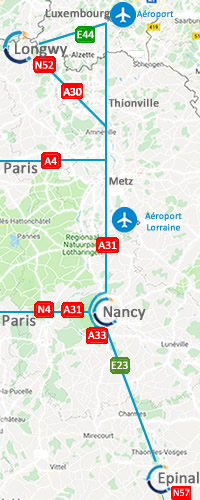Thierry Bastogne, professor at the University of Lorraine and researcher at CRAN (CNRS/University of Lorraine) has just been appointed to the Board of Directors of the Health competitiveness cluster in the Greater East: BioValley France. He will represent the University of Lorraine in the innovative projects led by BioValley. Meet him.
How is the cluster's governance organised and what is the place of research within it?
Thierry Bastogne: "Biovalley France is one of the six "Health" competitiveness clusters in France. It brings to the health sector in the Grand Est region its unique know-how around four major themes: innovative medicines and therapies, medical technologies, diagnostics and e-health. The BioValley France association is governed by a Board of Directors made up of 12 directors, divided into two colleges :
- research-training college: 4 members
- business college: 8 members
The Board appoints from among its members a president, two vice-presidents associated with the two colleges, a treasurer and a secretary. The cluster supports start-ups, SMEs, large groups, healthcare, research and training organisations in the Greater East of France in the field of health. Its mission is to help innovative projects emerge, to stimulate the creation of new products/services and to support the development of companies. BioValley France is also involved in structuring projects in the health sector".
What are your missions within the BioValley competitiveness cluster and for how long?
Thierry Bastogne: "I am one of the directors, elected from among 15 candidates, by the general meeting of 22 September 2020 with a two-year mandate. Our main role consists of three main missions:
- to set the cluster's strategic orientations,
- supervise their implementation in line with the orientations proposed and approved by the General Assembly,
- represent the members of each of the colleges.
In this case, my mission is to represent the University of Lorraine, itself a member of the cluster. In practice, this means regular interaction and joint work with the cluster's operational team. This collective exercise benefits in particular from the diversity of the cluster's administrators".
What are the future projects with the University of Lorraine?
Thierry Bastogne: "We are following several projects in which research units from the University of Lorraine are involved. This concerns, for example, the PsoriaCure project: European programme on the treatment of psoriasis, led by Temisis, the pharmaceutical subsidiary of Plant Advanced Technologies, in collaboration with the academic laboratory IMoPA (CNRS/University of Lorraine). This project was one of the five winners out of 378 applications in the framework of the European Union's EUROSTARS innovation programme. The objective of this three-year programme is to discover the mechanism of action of the proprietary "first-in-class" compound TEM1657 developed by Temisis for the treatment of psoriasis. TEM1657 is the strongest known regulator of the NFKBIZ target, at the heart of autoimmune inflammatory diseases. The cluster is currently considering how to increase the emergence of other structuring projects in Lorraine involving other laboratories at the University, particularly in the bioproduction sector".
Translated with www.DeepL.com/Translator (free version)






